Iran's Khamenei Meets Nigerian Ayatollah
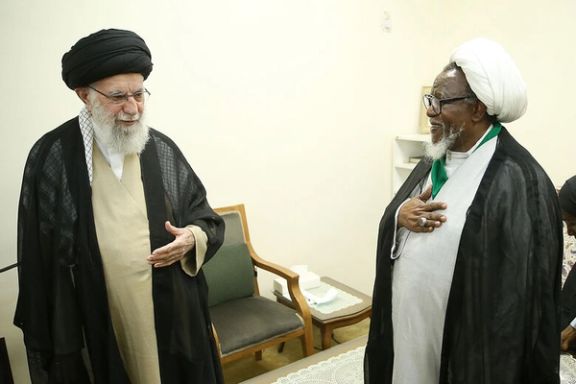
Iran’s Supreme Leader Ali Khamenei has rallied Nigeria's Shiite leader on a visit to Tehran, hailing the expansion of Shiite Islam and rallying for Palestine.

Iran’s Supreme Leader Ali Khamenei has rallied Nigeria's Shiite leader on a visit to Tehran, hailing the expansion of Shiite Islam and rallying for Palestine.
In a meeting with Sheikh Ibrahim Yaqoub El Zakzaky, Khamenei told him: “The Islamic Movement is expanding in Africa, Europe and North America,” rallying the world's Shiite population.
Zakzaky leads the Islamic Movement in Nigeria, a movement inspired by the Iranian Revolution that rejects Nigerian government authority. Known as Nigeria's Ayatollah, the outspoken cleric has been imprisoned for a range of charges including murder, culpable homicide, unlawful assembly and disruption of public peace as the government tries to quash the revolutionary movement.
“I hope you will be able to continue your fight,” said Khamenei, who backs Zakzaky's campaign to expand Shiite Islam in Nigeria where while around 50 percent of the country is Muslim, the majority is Sunni.
While Iran supports Nigeria's Islamic Movement, the regime also needs the support of the Nigerian government, last months energy talks discussing cooperation to combat energy challenges.
During the meeting of the two religious leaders, Khamenei raised the rally cry of the Palestinians as its proxy Hamas continues its war against Israel after an unprecedented and surprise attack on Saturday became the single most deadly day for Jews since the Holocaust.
“Everyone in the Islamic world has a duty to assist the Palestinians,” Khamenei said. Iran funds Hamas with around $100m a year in addition to military support and training but while Israeli officials accuse the Iranian regime of funding Hamas's surprise assault, Tehran denies involvement.
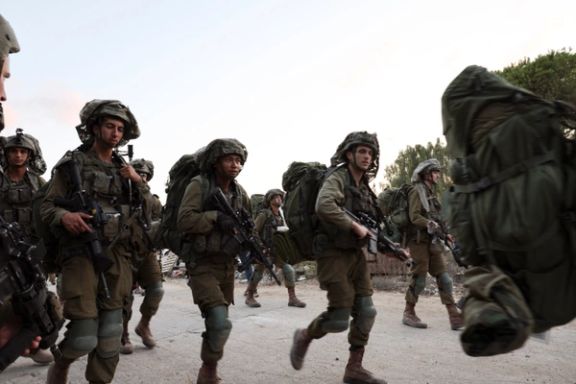
The Israeli Defense Forces (IDF) reported on Saturday that they had carried out extensive airstrikes overnight, resulting in the elimination of numerous Hamas members.
According to the IDF, Ali Qadhi, a company commander, was targeted in a drone strike, following intelligence coordination between the Shin Bet security agency and Military Intelligence Directorate. Qadhi had a history with Israel, having been arrested in 2005 for the abduction and murder of Israeli civilians. He had been released to the Gaza Strip as part of the 2011 Gilad Shalit prisoner exchange.
The airstrikes primarily focused on militants from the "Nukhba" branch of Hamas, identified by the IDF as a significant force behind the recent infiltration into Israel. The IDF statement highlighted that their operations had also struck the operational headquarters of Hamas responsible for aerial activities and resulted in the elimination of Merad Abu Merad, the head of the Hamas Aerial System in Gaza City.
The conflict between Hamas in the Gaza Strip and Israel began a week ago when Hamas initiated a surprise offensive on Israeli communities and cities along the southern border, killing well over 1,000 civilians and the abduction of more than 100 others.
Reports from Israeli media on Saturday morning indicated that the Israeli army had conducted raids in West Bank territories controlled by the Palestinian Authority, leading to the arrest of several senior Hamas leaders. The IDF has yet to officially confirm this development.
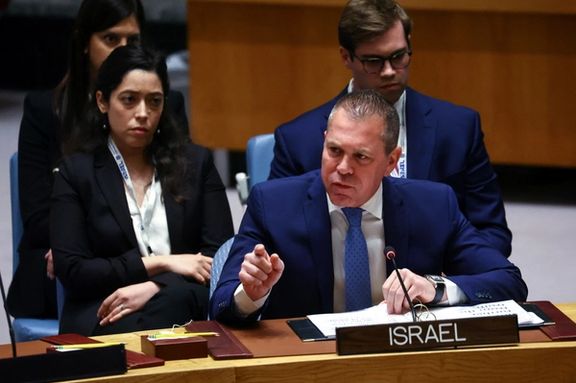
Israel's ambassador to the United Nations has called for a credible military threat to punish Iran for its ongoing support of terrorist groups.
In an interview with Iran International, the Israeli UN ambassador Gilad Erdan called the Iranian regime a global threat and said: “The Ayatollah regime today is exactly like the Nazi regime during WWII,” after Israeli civilians were slaughtered in the deadliest single day since the Holocaust last Saturday.
Erdan said when the leaders of Hamas publicly thank the Islamic Republic for providing them with weapons and funding, there is no need for us to prove Iran’s direct involvement in the offensive against Israel which saw thousands of Hamas militia enter Israel by air, land and sea last Saturday, after a barrage of thousands of rockets, which continues.
A recently resurfaced video of Izz el-Deen al-Qassam Brigades, the armed wing of Hamas, thanking Iranian leaders for providing them with “weapons, money and other equipment” has caused social media controversy, reinforcing the long-standing links between the group and Iranian regime.
“The situation in Gaza is under the responsibility of Hamas which has been oppressing people for the past 18 years and using every dollar that is being transferred to Gaza for humanitarian assistance and using it for its terror machine,” Erdan said.
Despite lauding Hamas' Al Aqsa Flood operation, which has resulted in more than 2,500 deaths in Israel and Gaza so far, Iran's ruler, Ali Khamenei denies any responsibility for the terror attack.
"We kiss the hands of those who planned the attack on the Zionist regime .... but those who claim that the recent victory belongs to non-Palestinians have miscalculated”, he said at a recent military graduation ceremony.
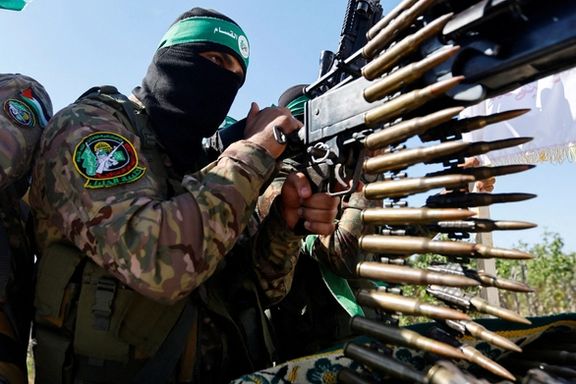
Iran's Foreign Minister adopts a more assertive tone. Currently, on a regional tour, Hossein Amir-Abdollahian stated that the resistance groups have planned for all possible scenarios warned, if Israel's attacks on Gaza do not cease immediately, the Hamas-Israel conflict might spread to other countries in the Middle East.
As of yet, the United States has not directly blamed Iran for the attack. National Security spokesman John Kirby said on Monday that the White House has not seen "hard, tangible evidence" that Iran was directly involved in Hamas' attacks against Israel.
In contrast, German Chancellor Olaf Scholz said on Thursday that Iran was responsible for helping Hamas grow to the point where it launched the attack on Israel last weekend, and that organizations that backed the Islamist movement would be severely repressed.
Meanwhile earlier this week, the UN Security Council was unable to reach the unanimity needed for a joint statement on the surprise ground and rocket attack on Israel, despite convening an emergency meeting behind closed doors. Members of the Security Council led by Russia were hoping for a broader focus than just condemning Hamas, according to diplomats.
The Iranian regime is a matter of direct concern for Israeli authorities. Prime Minister Benjamin Netanyahu blames Iran for having "encouraged and directed" the incident and Defense Minister Yoav Gallant also holds Iran responsible for funding the group: "Our neighbor is Hamas, the ISIS of Gaza. An organization enjoying the Iranian payroll," he said.
There is a clear incentive for Iran in this attack by Hamas because it coincides with a US-backed initiative aimed at encouraging Saudi Arabia to normalize its relations with Israel, which has been suspended, according to AFP.
According to the Washington-based Foundation for Defense of Democracies, Iran has established a network of at least 19 armed groups along Israel's borders, including in Gaza, the West Bank, Lebanon, and Syria. Hezbollah in Lebanon and Hamas in Gaza are the two largest of these organizations.

Iran's top Sunni leader Mowlavi Abdolhamid has contradicted the clerical regime on the Israeli-Palestinian conflict, saying that neither side should be destroyed.
Abdolhamid distanced himself from the regime’s goal of Israel's annihilation during his Friday prayer sermon, decried the attacks on civilians “that has shocked the world,” without directly mentioning the Tehran-backed Islamist group Hamas.
Hamas unleashed a bloody invasion into Israel on October 7, inflicting the biggest loss of life in one day since the Holocaust. Israel has been pounding Gaza in retaliation for the Hamas rampage in Israel this week that has killed over 1,300 people, the deadliest attack on civilians in the Israeli history. More than 1,800 Palestinians have been killed.
In an apparent condemnation of Hamas attack, he said, "If Muslims disregard international laws, assault women, and kills children, we do not blindly support it. "He noted that extremism by anyone is not tolerable. He emphasized that Israel should also refrain from violating international laws.
The outspoken cleric said, "Anyone with a shred of humanity is deeply affected when seeing these heart-wrenching scenes of human slaughter."
He added, "The reality is that neither Muslims can destroy Israel, nor Israel can eliminate Palestinians. It's not achievable. When something is not achievable, why use force?"
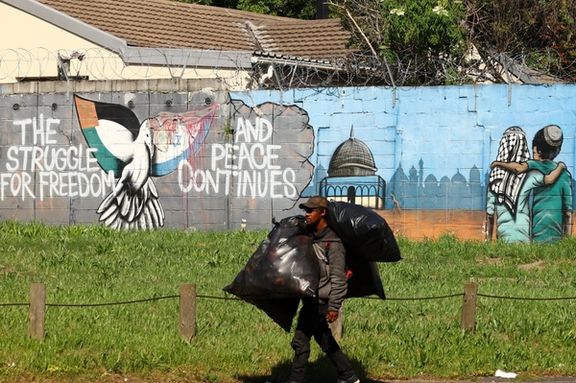
Abdolhamid emphasized the importance of maintaining a "fair stance" and suggested that governments and nations worldwide should strive to resolve differences rather than aligning themselves in this conflict. He said Israelis and Palestinians are two "nations" living alongside each other and also endorsed the idea of establishing two states.
The two-state solution to the Israeli–Palestinian conflict envisions an independent State of Palestine alongside the State of Israel, west of the Jordan River. The boundary between the two states is still subject to dispute and negotiation, with Palestinian and Arab leadership demanding full Israeli withdrawal from territories it occupied in 1967, which is rejected by Israel.
Abdolhamid’s practical views for a solution to the decades long conflict are in stark contrast to that of the Islamic Republic, which only sees the destruction of Israel as the solution.
In 2015, Supreme Leader Ali Khamenei said Israel must be destroyed in 25 years and the government even set up a countdown clock in Tehran and a few other cities. Many Iranians mock the anti-Israel rhetoric and the ticking clock, but the regime is adamant in pursuing the goal. Regime authorities use every opportunity to stress the necessity of "Israel's destruction," a slogan that has justified Iran’s huge financial and military support to militant groups such as Hamas and Hezbollah, while Iranian increasingly safe poverty and a bleak economic future.
While the Islamic Republic is cheering about the war in Israel, Iranians’ reactions to the regime’s propaganda indicate a complex societal schism. In Iran, once Khamenei dictates the regime's policy themes concerning global developments, other officials, clerics, and his representatives across the country begin to disseminate them.
Earlier in the year, Abdolhamid called for peace between Muslims and Jewish people, stating that "No one should think of the destruction of others, and everyone should think about peace." His remarks came against the backdrop of Iran’s repeated warnings against normalization of relations between Israel and Arab countries.
While Saudi Arabia and Israel had never been closer to a deal to establish official relations, US officials and a lot of pundits are of the opinion that the Hamas attack was meant to disrupt the normalization process.
After Abdolhamid’s sermons on Friday, people in several cities of the predominantly Sunni province of Sistan-Baluchestan took to streets and held anti-regime rallies.
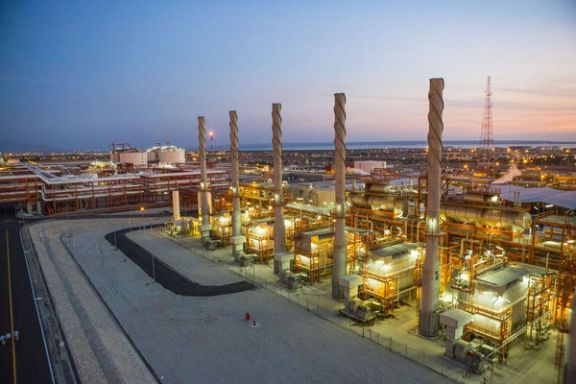
A worker has died in a fatal fall at the Parsian Gas Refinery in southern Iran during maintenance work on the flare.
Parsian Gas Refinery, a significant facility located near Mehr in Fars province, plays a crucial role in Iran's gas production, generating 760 million cubic feet of natural gas and 1,500 tons of gas condensates daily.
Similar incidents, including fires, falls, and gas leaks, have been on the rise in Iranian refineries and petrochemical units in recent years.
Just a month ago, Hashemi-Nezhad Gas Refinery Company in Khorasan Razavi province reported two fatalities and five hospitalizations due to a gas leak in one of its units.
Also, an incident during essential maintenance operations at the Pars South Gas Complex's second plant on September 10 led to one fatality and two injuries.
Iran has experienced a series of unexplained explosions and fires in military, nuclear, and industrial facilities, including pipelines and refineries, since mid-2020. Notably, on January 28, a massive fire erupted at an Iranian military industry factory, suspected to be the result of a drone strike in Esfahan. While authorities have not provided full explanations for these incidents, they have often attributed high-profile sabotage attacks to Israel, although Israel has not officially claimed responsibility for these events.
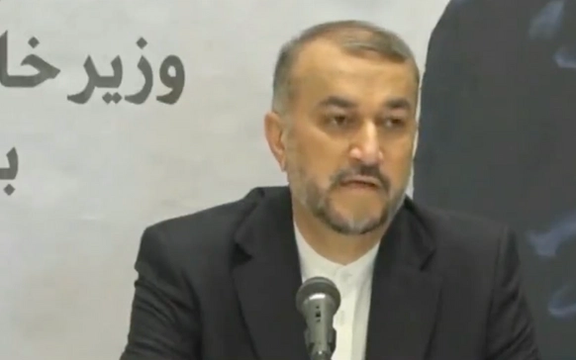
Iranian foreign minister Hossein Amir-Abdollahian entered Syria by the Lebanese land border Friday after two bombings this week closed Damascus and Aleppo airports.
Allahkaram Moshtaghi, the political advisor of the Iranian embassy in Beirut wrote on X that Israel "imagined stopping the revolutionary diplomacy of the Islamic Republic if it hit Damascus and Aleppo airports", but after meeting with senior Lebanese officials he has entered Syria through the land border of Lebanon.
Israeli missiles targeted the airports in the Syrian capital Damascus and Aleppo on Thursday, damaging their runways, according to Syrian military sources. The Israeli military does not comment on such reports.
As part of its ongoing operations against Iran-linked proxies in Syria, Israel has long targeted the Aleppo and Damascus airports. It has been reported that strikes on these airports are intended to disrupt Iranian supply lines to Syria, where Tehran has grown in influence since it began supporting President Bashar al-Assad in the 2011 civil war.
Amir-Abdollahian is on a regional tour that took him to Baghdad and Beirut where he warned that the Hamas-Israel conflict could spread to other parts of the Middle East if Israel's attacks on Gaza do not cease immediately.
The Iranian regime celebrated Hamas' bloody attack on Israel that killed well over 1,000 civilians and led to an ongoing war between Israel and Hamas.